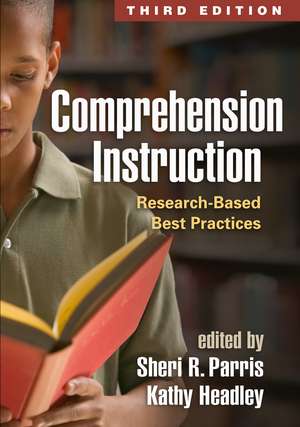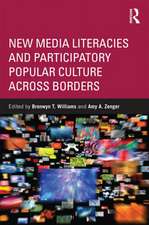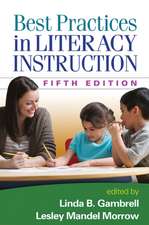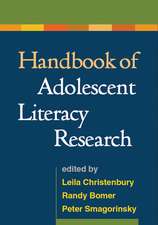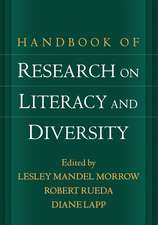Comprehension Instruction, Third Edition: Research-Based Best Practices
Editat de Sheri R. Parris, Kathy Headleyen Limba Engleză Hardback – 5 aug 2015
All key issues of research and practice in comprehension instruction are addressed in this highly regarded professional resource and course text. Leading scholars examine the processes that enable students to make meaning from what they read--and how this knowledge can be applied to improve teaching at all grade levels. Best practices for meeting the needs of diverse elementary and secondary students are identified. Essential topics include strategies for comprehending different types of texts, the impact of the Common Core State Standards (CCSS), cutting-edge assessment approaches, and the growing importance of digital genres and multimodal literacies. User-friendly features include end-of-chapter discussion questions.
New to This Edition
*Incorporates the latest research and instructional practices.
*Chapters on the CCSS, critical theory, culturally responsive instruction, and response to intervention.
*Chapters on teaching fiction and informational texts in the secondary grades.
*Expanded coverage of multimodal literacy learning.
*Timely topics such as text complexity, close reading, digital literacies, and neuroscience are discussed in multiple chapters.
New to This Edition
*Incorporates the latest research and instructional practices.
*Chapters on the CCSS, critical theory, culturally responsive instruction, and response to intervention.
*Chapters on teaching fiction and informational texts in the secondary grades.
*Expanded coverage of multimodal literacy learning.
*Timely topics such as text complexity, close reading, digital literacies, and neuroscience are discussed in multiple chapters.
Preț: 575.11 lei
Preț vechi: 625.12 lei
-8% Nou
Puncte Express: 863
Preț estimativ în valută:
110.06€ • 114.48$ • 90.86£
110.06€ • 114.48$ • 90.86£
Carte tipărită la comandă
Livrare economică 14-28 aprilie
Preluare comenzi: 021 569.72.76
Specificații
ISBN-13: 9781462520794
ISBN-10: 1462520790
Pagini: 418
Dimensiuni: 178 x 254 x 28 mm
Greutate: 0.98 kg
Ediția:3 Rev ed.
Editura: Guilford Publications
Colecția Guilford Press
ISBN-10: 1462520790
Pagini: 418
Dimensiuni: 178 x 254 x 28 mm
Greutate: 0.98 kg
Ediția:3 Rev ed.
Editura: Guilford Publications
Colecția Guilford Press
Public țintă
Professional and Professional Practice & DevelopmentCuprins
Introduction, Sheri R. Parris and Kathy Headley
I. Comprehension Instruction within Theoretical Frameworks
1. Beyond Borders: A Global Perspective on Reading Comprehension, Sheri R. Parris, Linda B. Gambrell, and Andreas Schleicher
2. Comprehension Instruction from a Critical Theory Viewpoint, Bogum Yoon
3. Using Inquiry Dialogue to Promote the Development of Argument Skills: Possibilities, Challenges, and New Directions, Alina Reznitskaya, Judy Yu-Li Hsu, and Richard C. Anderson
4. Reading Comprehension, Embodied Cognition, and Dual Coding Theory, Mark Sadoski
5. Executive Function and Reading Comprehension: The Critical Role of Cognitive Flexibility, Kelly B. Cartwright
6. Metacognition in Comprehension Instruction: New Directions, Linda Baker, Laura U. DeWyngaert, and Alisa Zeliger-Kandasamy
7. Constructivist Theory as a Framework for Instruction and Assessment of Reading Comprehension, Donna Caccamise, Angela Friend, Megan K. Littrell-Baez, and Eileen Kintsch
II. Comprehension Instruction Contexts
8. Comprehension Instruction within the Context of the Common Core, Evelyn Ford-Connors, Dana A. Robertson, Christine Leighton, Jeanne R. Paratore, C. Patrick Proctor, and Michelle Carney
9. Using Neuroscience to Inform Comprehension Instruction, Sheri R. Parris and Cathy Collins Block
10. Comprehension Instruction in Culturally Responsive Classrooms: A Review of Research and Practice, Ellen McIntyre
11. New Insights on Motivation in the Literacy Classroom, Jacquelynn A. Malloy
12. Research on Response-to-Intervention Supplemental Interventions: Where’s the Comprehension Instruction?, Deborah MacPhee, Elizabeth Bemiss, and Diane Stephens
13. Comprehension Instruction for At-Risk Students, Irma F. Brasseur-Hock, Michael F. Hock, and Donald D. Deshler
14. Comprehension Instruction for English Language Learners: New Perspectives, New Challenges, Robert Rueda, Norman J. Unrau, and Elena Son
III. Comprehension Instruction in Action
15. Best Practices for Comprehension Instruction in the Elementary Classroom, Nell K. Duke and Nicole M. Martin
16. Fiction Comprehension Instruction: Attending to Characters’ and Readers’ Emotional States, Laura B. Smolkin and Erin M. McTigue
17. Improving Comprehension of Informational Texts in the Elementary Classroom, Lisa S. Pao and Joanna P. Williams
18. Best Practices for Comprehension Instruction in the Secondary Classroom, Douglas Fisher and Nancy Frey
19. Improving Comprehension of Fictional Texts in the Secondary Classroom, Tiffany Ohlson, Heather Monroe-Ossi, and Sheri R. Parris
20. Improving Comprehension of Informational Texts in the Secondary Classroom, Vicki A. Jacobs and Jacy Ippolito
IV. Multimodal Literacies and Comprehension
21. Multimodal Literacy: Best Practices for Comprehension Instruction, Sally Lamping
22. Beyond Differentiation: Multimodal Literacy Learning, B. P. Laster
23. Research on Instruction and Assessment in the New Literacies of Online Reading Comprehension, Jill Castek, Julie Coiro, Laurie A. Henry, Donald J. Leu, and Douglas K. Hartman
24. Reading Digital: Designing and Teaching with eBooks and Digital Text, Bridget Dalton and David Rose
25. Games and Comprehension: The Importance of Specialist Language, James Paul Gee
26. New Literacies and Comprehension: Resources for Educators, Jan Lacina
27. Summing Up: Putting Comprehension Instruction in Context, Kathy Headley & Sheri R. Parris
I. Comprehension Instruction within Theoretical Frameworks
1. Beyond Borders: A Global Perspective on Reading Comprehension, Sheri R. Parris, Linda B. Gambrell, and Andreas Schleicher
2. Comprehension Instruction from a Critical Theory Viewpoint, Bogum Yoon
3. Using Inquiry Dialogue to Promote the Development of Argument Skills: Possibilities, Challenges, and New Directions, Alina Reznitskaya, Judy Yu-Li Hsu, and Richard C. Anderson
4. Reading Comprehension, Embodied Cognition, and Dual Coding Theory, Mark Sadoski
5. Executive Function and Reading Comprehension: The Critical Role of Cognitive Flexibility, Kelly B. Cartwright
6. Metacognition in Comprehension Instruction: New Directions, Linda Baker, Laura U. DeWyngaert, and Alisa Zeliger-Kandasamy
7. Constructivist Theory as a Framework for Instruction and Assessment of Reading Comprehension, Donna Caccamise, Angela Friend, Megan K. Littrell-Baez, and Eileen Kintsch
II. Comprehension Instruction Contexts
8. Comprehension Instruction within the Context of the Common Core, Evelyn Ford-Connors, Dana A. Robertson, Christine Leighton, Jeanne R. Paratore, C. Patrick Proctor, and Michelle Carney
9. Using Neuroscience to Inform Comprehension Instruction, Sheri R. Parris and Cathy Collins Block
10. Comprehension Instruction in Culturally Responsive Classrooms: A Review of Research and Practice, Ellen McIntyre
11. New Insights on Motivation in the Literacy Classroom, Jacquelynn A. Malloy
12. Research on Response-to-Intervention Supplemental Interventions: Where’s the Comprehension Instruction?, Deborah MacPhee, Elizabeth Bemiss, and Diane Stephens
13. Comprehension Instruction for At-Risk Students, Irma F. Brasseur-Hock, Michael F. Hock, and Donald D. Deshler
14. Comprehension Instruction for English Language Learners: New Perspectives, New Challenges, Robert Rueda, Norman J. Unrau, and Elena Son
III. Comprehension Instruction in Action
15. Best Practices for Comprehension Instruction in the Elementary Classroom, Nell K. Duke and Nicole M. Martin
16. Fiction Comprehension Instruction: Attending to Characters’ and Readers’ Emotional States, Laura B. Smolkin and Erin M. McTigue
17. Improving Comprehension of Informational Texts in the Elementary Classroom, Lisa S. Pao and Joanna P. Williams
18. Best Practices for Comprehension Instruction in the Secondary Classroom, Douglas Fisher and Nancy Frey
19. Improving Comprehension of Fictional Texts in the Secondary Classroom, Tiffany Ohlson, Heather Monroe-Ossi, and Sheri R. Parris
20. Improving Comprehension of Informational Texts in the Secondary Classroom, Vicki A. Jacobs and Jacy Ippolito
IV. Multimodal Literacies and Comprehension
21. Multimodal Literacy: Best Practices for Comprehension Instruction, Sally Lamping
22. Beyond Differentiation: Multimodal Literacy Learning, B. P. Laster
23. Research on Instruction and Assessment in the New Literacies of Online Reading Comprehension, Jill Castek, Julie Coiro, Laurie A. Henry, Donald J. Leu, and Douglas K. Hartman
24. Reading Digital: Designing and Teaching with eBooks and Digital Text, Bridget Dalton and David Rose
25. Games and Comprehension: The Importance of Specialist Language, James Paul Gee
26. New Literacies and Comprehension: Resources for Educators, Jan Lacina
27. Summing Up: Putting Comprehension Instruction in Context, Kathy Headley & Sheri R. Parris
Notă biografică
Sheri R. Parris, PhD, is an Associate Research Scientist with the Institute of Child Development at Texas Christian University and Adjunct Professor in the Master of Education program at Concordia University Texas. Previously, she was a high school English language arts teacher and a middle school computer literacy teacher, and held a variety of educational research positions. Dr. Parris’s areas of expertise include reading comprehension, adolescent literacy, and neuroscience as it relates to literacy, learning, and child development, with an emphasis on at-risk populations. She has coauthored numerous book chapters and journal articles.
Kathy Headley, EdD, is Associate Dean for Research and Graduate Studies in the College of Health, Education, and Human Development and Professor of Literacy in the Eugene T. Moore School of Education at Clemson University. Dr. Headley began her career as a teacher and reading specialist in Georgia. Her areas of expertise include adolescent literacy and writing, with specialized interests in comprehension and vocabulary. She has published articles in leading literacy journals and served on the Board of Directors of the International Reading Association.
Kathy Headley, EdD, is Associate Dean for Research and Graduate Studies in the College of Health, Education, and Human Development and Professor of Literacy in the Eugene T. Moore School of Education at Clemson University. Dr. Headley began her career as a teacher and reading specialist in Georgia. Her areas of expertise include adolescent literacy and writing, with specialized interests in comprehension and vocabulary. She has published articles in leading literacy journals and served on the Board of Directors of the International Reading Association.
Recenzii
"Want to know about the latest developments in comprehension instruction? This volume will tell you. The book reviews theory, research, and instructional practices. It includes current thinking about narrative and informational texts, linked to the CCSS, and examines the evolving research on new literacies and multimodal literacies. A solid read for those seeking advanced knowledge about comprehension and comprehension instruction in the 21st century."--Janice A. Dole, PhD, Department of Educational Psychology, University of Utah
"One of my favorite comprehension books of all time. The third edition continues the tradition of excellence, attesting to comprehension as a vast and multifaceted topic. There’s something for everyone in this book, with chapters exploring various grade levels, genres, and topics. The discussion questions at the end of each chapter are especially useful to spark productive conversations regarding how to best teach comprehension in all its complexity."--Donna Lamkin, MS, CAS, Literacy Coordinator, Capital Region Board of Cooperative Educational Services, Special Education Division, Albany, New York
"I know of no other text that explores so many realms of reading comprehension--assessment, remediation, policy implications, differentiation for diverse populations, and best practices in multiple contexts and multiple genres. I will eagerly share this book with my doctoral students as they consume and produce research in the area of reading comprehension. Not only do the contributors to the third edition present the most up-to-date research, but they also contribute thoughtfully to a multidisciplinary understanding of what comprehension entails in today’s classrooms."--Molly Ness, PhD, Division of Curriculum and Teaching, Fordham University Graduate School of Education
"I love this book! It is an excellent resource for teachers and teacher educators. The third edition addresses significant changes in the field. I especially appreciate the connections to the CCSS. Another strength is the book's emphasis on blending reading, writing, listening, and speaking in instruction. Anyone who is serious about teaching reading in today’s classrooms will find this volume a 'must have.'"--John Scovill, MEd, staff developer, Washington County (Utah) School District
-"One of my favorite comprehension books of all time. The third edition continues the tradition of excellence, attesting to comprehension as a vast and multifaceted topic. There’s something for everyone in this book, with chapters exploring various grade levels, genres, and topics. The discussion questions at the end of each chapter are especially useful to spark productive conversations regarding how to best teach comprehension in all its complexity."--Donna Lamkin, MS, CAS, Literacy Coordinator, Capital Region Board of Cooperative Educational Services, Special Education Division, Albany, New York
"I know of no other text that explores so many realms of reading comprehension--assessment, remediation, policy implications, differentiation for diverse populations, and best practices in multiple contexts and multiple genres. I will eagerly share this book with my doctoral students as they consume and produce research in the area of reading comprehension. Not only do the contributors to the third edition present the most up-to-date research, but they also contribute thoughtfully to a multidisciplinary understanding of what comprehension entails in today’s classrooms."--Molly Ness, PhD, Division of Curriculum and Teaching, Fordham University Graduate School of Education
"I love this book! It is an excellent resource for teachers and teacher educators. The third edition addresses significant changes in the field. I especially appreciate the connections to the CCSS. Another strength is the book's emphasis on blending reading, writing, listening, and speaking in instruction. Anyone who is serious about teaching reading in today’s classrooms will find this volume a 'must have.'"--John Scovill, MEd, staff developer, Washington County (Utah) School District
Descriere
All key issues of research and practice in comprehension instruction are addressed in this highly regarded professional resource and course text.
